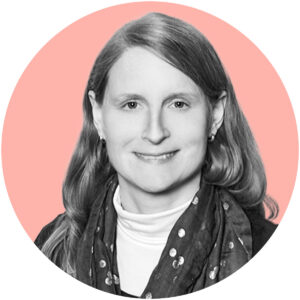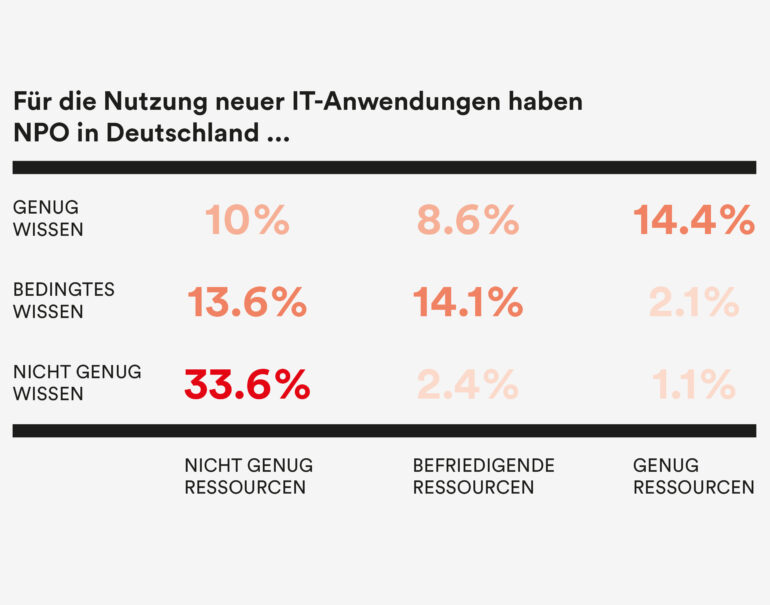When it comes to digital maturity and the use of data, there are substantial differences between regions, between sectors – and within them. The reasons behind this are complex, but the right approach can have a wide-ranging impact.
‘One problem is that there’s a chasm between organisations with a high level of digital maturity and those that are just starting to grapple with this issue – and this chasm actually keeps getting wider,’ says Sarah Hermes, explaining one of the findings of the Digital Report, published in 2020. She is Head of IT for Non-Profits at the Haus des Stiftens in Munich. This social enterprise was founded by the nonprofit Brochier Stiftung and publishes the report in question. When the report surveyed the level of digitisation across Germany’s third sector in 2020, it found that some organisations have certainly come a very long way indeed.

At the same time, however, the data indicates that many organisations are merely at the start of their journey, especially in rural areas with weak infrastructure. ‘They shouldn’t be left behind,’ cautions Sarah Hermes.
Digital maturity
A shortage of financial resources is a fundamental issue in the NPO sector. This is particularly noticeable in the field of IT: IT services are pricey, which exacerbates the problem. ‘NPOs face the challenge of only being able to use a limited amount of their financial resources for administrative expenses and infrastructure costs,’ says Sarah Hermes. This makes it harder to finance IT projects. However, the survey indicates that investments in IT alone are not enough. ‘Access to resources also depends on an organisation’s level of digital maturity,’ she says. ‘The more digitally mature they are, the more access they have to the necessary resources and the more effectively these resources can be used, too.’ In specific terms, the report reveals that a third of NPOs lack resources and knowledge alike, with a mere 14 per cent having enough of both. All told, the shortage of resources is greater than the shortage of knowledge: 10 per cent of NPOs have the knowledge but not the resources, while just 1 per cent have the resources but not the knowledge. Furthermore, the report evinces a connection between the level of digital maturity and an NPO’s overarching skills. Organisations pursuing an evidence-based strategy undergo swifter development over the course of their digital transformation. An innovation-driven approach and alignment with stakeholder groups also support digitisation. The Digital Report’s findings on how data is handled underline the multi-faceted nature of the challenge at hand and, at the same time, the potential at stake. The majority of NPOs collect data, but most of them do not use it consistently. ‘This means,’ says Sarah Hermes, ‘that, once they’ve collected this data, most of these organisations aren’t actually making it available and using it to optimise their offerings or review whether they’re meeting their objectives.’ The main reasons for this untapped potential are an inadequate awareness of the issue itself and a high day-to-day workload, paired with a shortage of resources.
A widening data divide
Kriss Deiglmeier, Chief Social Impact Officer at Splunk also sees the lack of financial resources as one of the greatest challenges. Splunk, a global technology company that provides the leading unified security and observability platform, helps organisations use data at any scale to become more resilient so they can innovate with agility and speed. According to Ms. Deiglmeier, NPOs in general face a challenge, the data divide.

The data divide is the expanding use of data to create commercial value and the comparatively weak use of data to solve social and environmental challenges. ‘Yes, the lack of financial resources is a significant barrier to bridging the divide,’ she says. But it’s not just money that’s needed. At the root of the problem is actually the old funding models of state and philanthropic sponsors. She mentions three factors that prevent social and ecological progress: Donors support projects, not organisations. The funding they provide is often earmarked for a particular purpose and not general operating costs. Ultimately, they limit the overhead expenses of organisations. This narrow, limited approach impairs the ability of an organisation to drive forward the impact of data. It means the organisations cannot invest in data structures or talents that are crucial to delivering effective and impactful services. But it’s precisely here that the potential lies. Ms. Deiglmeier says: ‘In a digital and data-driven economy, data is an asset that unlocks knowledge and makes us smarter.’ In a world powered by data, it is a key ingredient to find solutions that work and can be replicated, she says. If there is no investment in organisations’ data capacities, then it is people and the environment that suffer in the end. There is no single reason for the data divide. In fact, several complex, intertwined factors are responsible. The second important reason, apart from financial resources, is that the sector is lagging far behind when it comes to developing a robust data ecosystem. This quality is not just characterised by the data. Structure, platforms and decision-support tools are just as significant, in her view. If, for instance, government authorities collect data by a method that means they cannot be processed by external software programmes, then this renders them unusable in any meaningful way. ‘Organisations need to open up their systems and thinking to allow for more robust and widespread data collection and use,’ insists Ms. Deiglmeier. ‘However, to truly tackle the data divide for social and environmental impact will require cross-sector collaborations.’ She calls for long-term commitment and global collaboration between businesses, civil society and governments. Where social impact is concerned, she feels that society is only taking its first steps in its relationship with data and its understanding of the data divide. This makes it all the more important to start this journey now. ‘The good news,’ she says, ‘is that there’s pivotal work already happening in the sector that is making it easier to build this functioning ecosystem and make the needed future-forward changes.’ She adds: ‘To drive the power of data for a more just, sustainable, and prosperous world, we need to be bold enough to build the complete system and not be satisfied with piecemeal work.’

Data competence as the bedrock
Ms. Deiglmeier believes that achieving this will require more significant social change. ‘We need to start thinking about data literacy as a must-have essential life skill,’ she says. She considers data competence to be central to improving the situation. She compares this with financial competence: we need a basic level of knowledge in order to function in society. And as the world is being determined by data to an ever-greater extent, data competence is critical. ‘We all need the ability to read, understand, create, and communicate data because it’s the key to unlocking information and building knowledge,’ says Ms. Deiglmeier. For NGOs, staff working in programmes, communications, finance and human resources at all levels need to understand data. ‘Investing this data talent and skill-building needs to be a priority for NGO leaders and funders,’ she says.
‘We must recognize data as an essential life skill.’
Kriss Deiglmeier, Chief of Social Impact bei Splunk
Potential or disadvantage
Internationally, the data divide exhibits a variety of disadvantages and potentials. Developing countries are at a disadvantage in bridging the data divide, because their governments and the local NGOs often do not have the tools or resources needed to access and utilise big data. ‘They will likely continue to fall behind,’ predicts Ms. Deiglmeier. Statistics reveal a clear divide: according to a report from the International Data Corporation (IDC), spending on big data and analysis solutions exceeded USD 215 billion in 2021. More than half of this was spent in the United States. However, the latest technological developments offer opportunities: ‘Investing in and empowering countries to use data to address their social and environmental challenges increases their likelihood of success.,’ says Ms. Deiglmeier. Poorer countries can catch up with higher-income countries, and in creative and innovative ways. The development of communication technology is an example. With the introduction of the mobile phone, developing countries became able to circumvent old systems that required expensive infrastructure. They were able to connect their countries in cheaper and more effective ways. However, industrialised countries have to support less developed countries along this road. Ms Deiglmeier considers global philanthropy, governmental aid and businesses to be duty-bound to be generous with their investments, as well as with their data and data support resources. ‘It is critical that all NGOs have access to the data needed to drive their missions forward. To get there, we’ll need all the players to contribute.,’ she says. ‘After all, the beauty of data is its sharable nature. Then, for example, countries and regions with health data can help local NGOs serving the same or similar populations. And so much more.’
An uptick in demand
At present, Germany is in a relatively good position as regards the digital maturity of its NGOs, compared to other countries around the world – even though Sarah Hermes believes that some other European countries are further ahead. Aspects that determine a country’s development in this respect include its culture and society, along with network coverage and availability. Sarah Hermes thinks there are several ways to further boost the digitisation of the sector in Germany. Alongside financial support, which is already being bolstered with various initiatives, she highlights access to expertise: ‘At the Haus des Stiftens, we’re noticing an uptick in demand from NPOs for various services, such as free webinars or IT workshops,’ she says. There is a growing willingness to engage with this topic, something that is also reflected in the use of tools. While digital tools have long been seen primarily as a way of making work easier, Sarah Hermes is noticing how they’re increasingly being used in the sector to boost impact: ‘This topic has visibly gathered momentum over the crises of the last few years, be it the coronavirus pandemic, the catastrophic floods in Germany or the war in Ukraine, which has emphasised the need to use digital tools.’ Furthermore, she believes ‘that the use of online fundraising platforms can really accelerate impact – with nonprofits also turning to this approach more frequently.’


